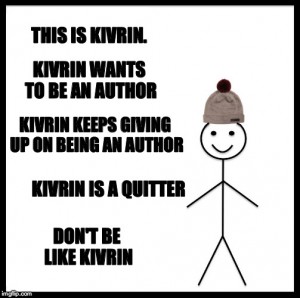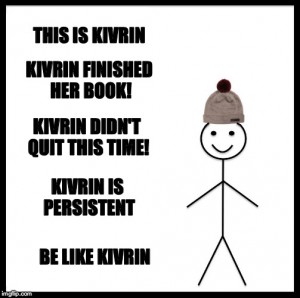 I’d like to share the story of how I finally won the war against myself. It was a long war, but I’ll try to make it a short story.
I’d like to share the story of how I finally won the war against myself. It was a long war, but I’ll try to make it a short story.
Some of my favorite authors are slow writers. But there’s slow…and then there’s me.
When writing Bend, my first contemporary romance novel, it technically took me about 12 months to get from start to end. But if you count how long it’d been since the last time I’d finished writing a manuscript? Make that 12 years.
I wrote my first historical romance novel manuscript in 2001. Then I wrote another and another. Three years later, after much hard work, I had finally managed to whip one into a good enough shape to try and snag an agent. It took a few months, but when I got an offer of representation (the first big hurdle in the publishing world), I thought, Yay! I’m going to get published!
For a while publishers kept sending us some very lovely rejections, full of praise, and then at the end, the dreaded sentence starting with the word “unfortunately…” Then one day I got some happy news: one of the editors liked it and had sent it on for a second read by a senior editor. I thought, Yay! I’m going to get published!
You know how this part of the story ends, right?
This publisher ended up echoing what everyone else had said, that the story didn’t have enough of a “hook,” and that it wasn’t “marketable” enough. My agent said they had asked if I’d consider writing a contemporary romance instead. I emphatically refused. My passion lay with history. I’m fascinated with the past, and I loved writing stories where I got to live there for a while.
The words “hook” and “marketable” threw me for a loop, though, and for the next 11 years I started and quit writing about a dozen different historical romances.
In late 2014, I re-started a historical manuscript (that I’d started and given up on four times before, but fifth time’s a charm, right?). This time I had a plan. At the same time, I began a contemporary story that was meant to be a fluffy, sexy novella. The idea was that whenever I needed a break from the historical, I’d work on this easy and fun contemporary until I felt like writing the historical again. Switching back and forth…that was the answer.
 Except plotting the contemporary was more fun. The characters were more alive and interesting. Writing it was easier…and more fun. A year later, I finished Bend. For the first time in over a decade, I actually finished writing a book.
Except plotting the contemporary was more fun. The characters were more alive and interesting. Writing it was easier…and more fun. A year later, I finished Bend. For the first time in over a decade, I actually finished writing a book.
Did I have moments where I wanted to quit? Almost every day. So I guess the question is, why was I able to keep going? I’m not exactly sure. The research was definitely easier, so that played a part. But perhaps the main reason was that Mia and Jay never stopped talking to me. I never lost interest in telling their story. I often doubted that I was telling it well, yes, but writing a contemporary meant I felt like I was writing about real people. Which made abandoning them that much harder.
And the reason I chose to indie publish this story instead of sending it off to my agent and trying to sell it to publishers? Well, it comes down to being impatient (I wanted to get it out there as soon as it’s done) and being a bit of a control freak who prefers being in charge of everything myself. It’s a lot of work, yes, but this way the book remains 100% my baby.
Moral of the story: Don’t ever be a full-time quitter. If you only do it part of the time, it’ll take you a while to achieve your dreams (okay, most likely a long time), but you’ll get there eventually.

Kivrin,
I took a chance on your book and loved it! I always like to read “debut” authors, it’s something about being on the breaking ground of an authors success with them that inspires me. I read your story about being a quitter–and it really hit home. I am an inspiring author myself and have written short stories in the past that I never published, and started a real full-length novel over two years ago. Sadly, it’s taken that long for me to really get my momentum. Well, I finally have it! My story is 75% completed. And reading your words were encouraging. I’d also been playing around with the idea of Indie publishing–and you have now convinced me that that is the way that I want to go 🙂 Good job on Mia and Jays story! I’ll take any advice that you have to share.
Signed,
Your newest fan 🙂
So glad you enjoyed Bend, Krista! And congratulations on almost finishing your story! If you’re like me, you’ll write faster and faster the closer you get to the end, so before you know it, you’ll have a completed manuscript. Yay! 🙂
I’m still a newbie in every way that matters, but here are some observations on going the indie publishing route.
1. YOU’RE ESSENTIALLY STARTING A BUSINESS. You’ll have start-up costs, and it can take a while to make a profit. You’re pretty much on your own, so if you’re not business savvy already, start educating yourself.
2. EDITING IS CRUCIAL. Once you’re done, polish that story until it shines. Don’t be afraid to delete and rewrite. Try to find beta readers/critique partners who will give you honest feedback. Consider hiring a content editor (optional, especially if you have good betas). Do hire a good copy editor (not optional), and try to find one before you’re done with the story, because their schedules can get full quickly.
3. COVER! You want a good and professional looking cover. To make this more budget friendly, there are some great pre-made cover options out there, which you can find by Googling or searching for pre-made cover groups on Facebook. If you decide to get a custom cover, as with a copy editor, start looking for a designer sooner rather than later.
4. BLURB! This one is so important. I can’t stress enough how crucial it is to have a compelling blurb/description that will hook the reader. I’m pretty terrible at writing blurbs myself but am fortunate to have a friend who’s great at them and doesn’t mind helping me. If you’re stuck writing it yourself, I suggest studying the blurbs of successful indie authors and/or your favorite authors/books. Pick them apart and try to figure out what about them makes you want to read the books.
5. FORMATTING. Your book will need formatting, for ebook and also paperback if you choose to make it available in print. You can hire someone to do it, but if you’re tech savvy, you can also learn to do it yourself with some smart Googling.
6. JOIN INDIE GROUPS. There are a lot of groups where indie authors share advice, especially on Facebook. Check out Author Support Network. It’s fantastic! When I have questions, I can usually find the answers by searching their post history.
Hope this helps, Krista. Best wishes on your publishing journey!